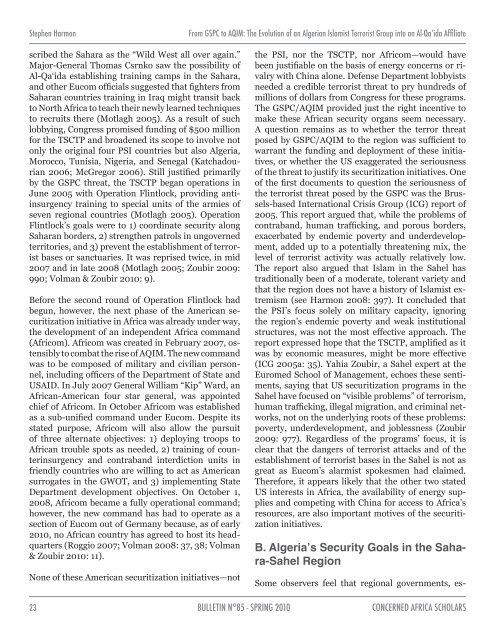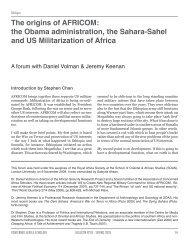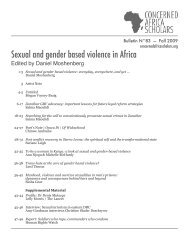Western Sahara and the United States' geographical imaginings
Western Sahara and the United States' geographical imaginings
Western Sahara and the United States' geographical imaginings
Create successful ePaper yourself
Turn your PDF publications into a flip-book with our unique Google optimized e-Paper software.
Stephen Harmon From GSPC to AQIM: The Evolution of an Algerian Islamist Terrorist Group into an Al-Qa‘ida Affiliate<br />
scribed <strong>the</strong> <strong>Sahara</strong> as <strong>the</strong> “Wild West all over again.”<br />
Major-General Thomas Csrnko saw <strong>the</strong> possibility of<br />
Al-Qa‘ida establishing training camps in <strong>the</strong> <strong>Sahara</strong>,<br />
<strong>and</strong> o<strong>the</strong>r Eucom officials suggested that fighters from<br />
<strong>Sahara</strong>n countries training in Iraq might transit back<br />
to North Africa to teach <strong>the</strong>ir newly learned techniques<br />
to recruits <strong>the</strong>re (Motlagh 2005). As a result of such<br />
lobbying, Congress promised funding of $500 million<br />
for <strong>the</strong> TSCTP <strong>and</strong> broadened its scope to involve not<br />
only <strong>the</strong> original four PSI countries but also Algeria,<br />
Morocco, Tunisia, Nigeria, <strong>and</strong> Senegal (Katchadourian<br />
2006; McGregor 2006). Still justified primarily<br />
by <strong>the</strong> GSPC threat, <strong>the</strong> TSCTP began operations in<br />
June 2005 with Operation Flintlock, providing antiinsurgency<br />
training to special units of <strong>the</strong> armies of<br />
seven regional countries (Motlagh 2005). Operation<br />
Flintlock’s goals were to 1) coordinate security along<br />
<strong>Sahara</strong>n borders, 2) streng<strong>the</strong>n patrols in ungoverned<br />
territories, <strong>and</strong> 3) prevent <strong>the</strong> establishment of terrorist<br />
bases or sanctuaries. It was reprised twice, in mid<br />
2007 <strong>and</strong> in late 2008 (Motlagh 2005; Zoubir 2009:<br />
990; Volman & Zoubir 2010: 9).<br />
Before <strong>the</strong> second round of Operation Flintlock had<br />
begun, however, <strong>the</strong> next phase of <strong>the</strong> American securitization<br />
initiative in Africa was already under way,<br />
<strong>the</strong> development of an independent Africa comm<strong>and</strong><br />
(Africom). Africom was created in February 2007, ostensibly<br />
to combat <strong>the</strong> rise of AQIM. The new comm<strong>and</strong><br />
was to be composed of military <strong>and</strong> civilian personnel,<br />
including officers of <strong>the</strong> Department of State <strong>and</strong><br />
USAID. In July 2007 General William “Kip” Ward, an<br />
African-American four star general, was appointed<br />
chief of Africom. In October Africom was established<br />
as a sub-unified comm<strong>and</strong> under Eucom. Despite its<br />
stated purpose, Africom will also allow <strong>the</strong> pursuit<br />
of three alternate objectives: 1) deploying troops to<br />
African trouble spots as needed, 2) training of counterinsurgency<br />
<strong>and</strong> contrab<strong>and</strong> interdiction units in<br />
friendly countries who are willing to act as American<br />
surrogates in <strong>the</strong> GWOT, <strong>and</strong> 3) implementing State<br />
Department development objectives. On October 1,<br />
2008, Africom became a fully operational comm<strong>and</strong>;<br />
however, <strong>the</strong> new comm<strong>and</strong> has had to operate as a<br />
section of Eucom out of Germany because, as of early<br />
2010, no African country has agreed to host its headquarters<br />
(Roggio 2007; Volman 2008: 37, 38; Volman<br />
& Zoubir 2010: 11).<br />
None of <strong>the</strong>se American securitization initiatives—not<br />
2<br />
BULLETIN N°85 - SPRING 2010<br />
<strong>the</strong> PSI, nor <strong>the</strong> TSCTP, nor Africom—would have<br />
been justifiable on <strong>the</strong> basis of energy concerns or rivalry<br />
with China alone. Defense Department lobbyists<br />
needed a credible terrorist threat to pry hundreds of<br />
millions of dollars from Congress for <strong>the</strong>se programs.<br />
The GSPC/AQIM provided just <strong>the</strong> right incentive to<br />
make <strong>the</strong>se African security organs seem necessary.<br />
A question remains as to whe<strong>the</strong>r <strong>the</strong> terror threat<br />
posed by GSPC/AQIM to <strong>the</strong> region was sufficient to<br />
warrant <strong>the</strong> funding <strong>and</strong> deployment of <strong>the</strong>se initiatives,<br />
or whe<strong>the</strong>r <strong>the</strong> US exaggerated <strong>the</strong> seriousness<br />
of <strong>the</strong> threat to justify its securitization initiatives. One<br />
of <strong>the</strong> first documents to question <strong>the</strong> seriousness of<br />
<strong>the</strong> terrorist threat posed by <strong>the</strong> GSPC was <strong>the</strong> Brussels-based<br />
International Crisis Group (ICG) report of<br />
2005. This report argued that, while <strong>the</strong> problems of<br />
contrab<strong>and</strong>, human trafficking, <strong>and</strong> porous borders,<br />
exacerbated by endemic poverty <strong>and</strong> underdevelopment,<br />
added up to a potentially threatening mix, <strong>the</strong><br />
level of terrorist activity was actually relatively low.<br />
The report also argued that Islam in <strong>the</strong> Sahel has<br />
traditionally been of a moderate, tolerant variety <strong>and</strong><br />
that <strong>the</strong> region does not have a history of Islamist extremism<br />
(see Harmon 2008: 397). It concluded that<br />
<strong>the</strong> PSI’s focus solely on military capacity, ignoring<br />
<strong>the</strong> region’s endemic poverty <strong>and</strong> weak institutional<br />
structures, was not <strong>the</strong> most effective approach. The<br />
report expressed hope that <strong>the</strong> TSCTP, amplified as it<br />
was by economic measures, might be more effective<br />
(ICG 2005a: 35). Yahia Zoubir, a Sahel expert at <strong>the</strong><br />
Euromed School of Management, echoes <strong>the</strong>se sentiments,<br />
saying that US securitization programs in <strong>the</strong><br />
Sahel have focused on “visible problems” of terrorism,<br />
human trafficking, illegal migration, <strong>and</strong> criminal networks,<br />
not on <strong>the</strong> underlying roots of <strong>the</strong>se problems:<br />
poverty, underdevelopment, <strong>and</strong> joblessness (Zoubir<br />
2009: 977). Regardless of <strong>the</strong> programs’ focus, it is<br />
clear that <strong>the</strong> dangers of terrorist attacks <strong>and</strong> of <strong>the</strong><br />
establishment of terrorist bases in <strong>the</strong> Sahel is not as<br />
great as Eucom’s alarmist spokesmen had claimed.<br />
Therefore, it appears likely that <strong>the</strong> o<strong>the</strong>r two stated<br />
US interests in Africa, <strong>the</strong> availability of energy supplies<br />
<strong>and</strong> competing with China for access to Africa’s<br />
resources, are also important motives of <strong>the</strong> securitization<br />
initiatives.<br />
B. Algeria’s Security Goals in <strong>the</strong> <strong>Sahara</strong>-Sahel<br />
Region<br />
Some observers feel that regional governments, es-<br />
CONCERNED AFRICA SCHOLARS




